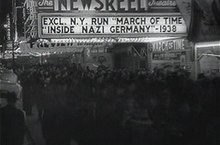
Triumph of the Will is a 1935 German Nazi propaganda film directed, produced, edited and co-written by Leni Riefenstahl. Adolf Hitler commissioned the film and served as an unofficial executive producer; his name appears in the opening titles. It chronicles the 1934 Nazi Party Congress in Nuremberg, which was attended by more than 700,000 Nazi supporters. The film contains excerpts of speeches given by Nazi leaders at the Congress, including Hitler, Rudolf Hess and Julius Streicher, interspersed with footage of massed Sturmabteilung (SA) and Schutzstaffel (SS) troops and public reaction. Its overriding theme is the return of Germany as a great power with Hitler as its leader. The film was produced after the Night of the Long Knives, and many formerly prominent SA members are absent.

Why We Fight is a series of seven propaganda films produced by the US Department of War from 1942 to 1945, during World War II. It was originally written for American soldiers to help them understand why the United States was involved in the war, but US President Franklin Roosevelt ordered distribution for public viewing.

The Battle of San Pietro is a documentary film directed by John Huston about the Battle of San Pietro Infine, 60 mi (97 km) from Naples, during World War II. It was shot by Jules Buck. It was released in the US in 1945 but shown to US troops earlier.

Newsreel footage of the 6 May 1937 Hindenburg disaster, where the zeppelin LZ 129 Hindenburg crashed and burned down, was filmed by several companies.

King: A Filmed Record... Montgomery to Memphis is a 1970 American documentary film biography of Martin Luther King Jr. and his creation and leadership of the nonviolent campaign for civil rights and social and economic justice in the Civil Rights Movement.

Judgment at Nuremberg is a 1961 American epic legal drama film directed and produced by Stanley Kramer, and written by Abby Mann. It features Spencer Tracy, Burt Lancaster, Richard Widmark, Maximilian Schell, Werner Klemperer, Marlene Dietrich, Judy Garland, William Shatner, and Montgomery Clift. Set in Nuremberg, West Germany, the film depicts a fictionalized version – with fictional characters – of the Judges' Trial of 1947, one of the twelve Nuremberg Military Tribunals conducted under the auspices of the U.S. military in the aftermath of World War II.

The Atomic Cafe is a 1982 American documentary film directed by Kevin Rafferty, Jayne Loader and Pierce Rafferty. It is a compilation of clips from newsreels, military training films, and other footage produced in the United States early in the Cold War on the subject of nuclear warfare. Without any narration, the footage is edited and presented in a manner to demonstrate how misinformation and propaganda was used by the U.S. government and popular culture to ease fears about nuclear weapons among the American public.

A newsreel is a form of short documentary film, containing news stories and items of topical interest, that was prevalent between the 1910s and the mid 1970s. Typically presented in a cinema, newsreels were a source of current affairs, information, and entertainment for millions of moviegoers. Newsreels were typically exhibited preceding a feature film, but there were also dedicated newsreel theaters in many major cities in the 1930s and ’40s, and some large city cinemas also included a smaller theaterette where newsreels were screened continuously throughout the day.
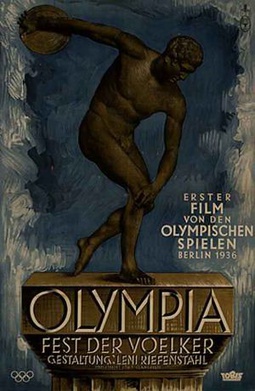
Olympia is a 1938 German documentary film written, directed and produced by Leni Riefenstahl, which documented the 1936 Summer Olympics, held in the Olympic Stadium in Berlin during the Nazi period. The film was released in two parts: Olympia 1. Teil — Fest der Völker and Olympia 2. Teil — Fest der Schönheit. The 1936 Summer Olympics torch relay, as devised for the Games by the secretary general of the Organizing Committee, Dr. Carl Diem, is shown in the film.

The March of Time is an American newsreel series sponsored by Time Inc. and shown in movie theaters from 1935 to 1951. It was based on a radio news series broadcast from 1931 to 1945 that was produced by advertising agency Batten, Barton, Durstine & Osborn (BBDO). The "voice" of both series was Westbrook Van Voorhis. Produced and written by Louis de Rochemont and his brother Richard de Rochemont, The March of Time was recognized with an Academy Honorary Award in 1937.

Nazism made extensive use of the cinema throughout its history. Though it was a relatively new technology, the Nazi Party established a film department soon after it rose to power in Germany. Both Adolf Hitler and his propaganda minister, Joseph Goebbels, used the many Nazi films to promote the party ideology and show their influence in the burgeoning art form, which was an object of personal fascination for Hitler. The Nazis valued film as a propaganda instrument of enormous power, courting the masses by means of slogans that were aimed directly at the instincts and emotions of the people. The Department of Film also used the economic power of German moviegoers to influence the international film market. This resulted in almost all Hollywood producers censoring films critical of Nazism during the 1930s, as well as showing news shorts produced by the Nazis in American theaters.

Into the Arms of Strangers: Stories of the Kindertransport is a 2000 documentary film about the British rescue operation known as the Kindertransport, which saved the lives of over 10,000 Jewish and other children from Nazi Germany, Austria, Czechoslovakia, and Danzig by transporting them via train, boat, and plane to Great Britain. These children, or Kinder in German, were taken into foster homes and hostels in Britain, expecting eventually to be reunited with their parents. The majority of them never saw their families again. Written and directed by Mark Jonathan Harris, produced by Deborah Oppenheimer, narrated by Judi Dench, and made with the cooperation of the United States Holocaust Memorial Museum, it utilized rare and extensive footage, photographs, and artifacts, and is told in the words of the child survivors, rescuers, parents, and foster parents.

The National Recording Registry is a list of sound recordings that "are culturally, historically, or aesthetically significant, and inform or reflect life in the United States." The registry was established by the National Recording Preservation Act of 2000, which created the National Recording Preservation Board, whose members are appointed by the Librarian of Congress. The recordings preserved in the United States National Recording Registry form a registry of recordings selected yearly by the National Recording Preservation Board for preservation in the Library of Congress.
Helen Keller in Her Story is a 1954 American biographical documentary about Helen Keller.

The National Film Registry (NFR) is the United States National Film Preservation Board's (NFPB) collection of films selected for preservation, each selected for its historical, cultural and aesthetic contributions since the NFPB's inception in 1988.
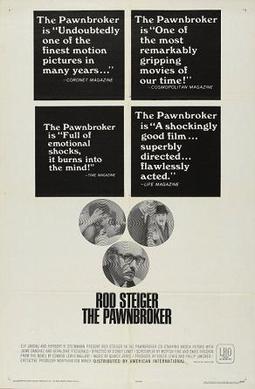
The Pawnbroker is a 1964 American drama film directed by Sidney Lumet, starring Rod Steiger, Geraldine Fitzgerald, Brock Peters, Jaime Sánchez and Morgan Freeman in his feature film debut. The screenplay was an adaptation by Morton S. Fine and David Friedkin from the 1961 novel of the same name by Edward Lewis Wallant.
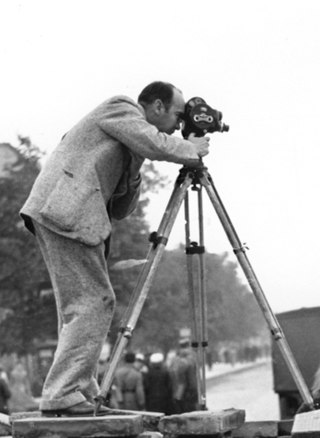
Julien Hequembourg Bryan was an American photographer, filmmaker, and documentarian who documented the daily life in Poland, Soviet Union, and Nazi Germany between 1935 and 1939, in the leadup to and early days of the Second World War. He was honored with a Decoration of Honor Meritorious for Polish Culture during his last visit in Poland (1974) for showing the truth about the Invasion of Poland.

Aquila Polonica is an independent publishing house based in the U.S. and the U.K., founded in 2005 by Terry A. Tegnazian and Stefan Mucha. The company specializes in books based on eyewitness accounts, in English, of Poland in World War II.
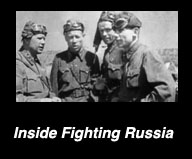
Inside Fighting Russia is a 1942 22-minute Canadian short documentary film produced by the National Film Board of Canada (NFB) for distribution by United Artists, as part of the wartime The World in Action series. The film documents Russia's fight against Nazi Germany during the Second World War. Inside Fighting Russia is produced by Stuart Legg, and narrated by Lorne Greene. The film's French version title is La Russie sous les armes.

Food - Weapon of Conquest is a 22-minute 1941 Canadian documentary film, made by the National Film Board of Canada (NFB) as part of the wartime Canada Carries On series. The film was written, directed and produced by Stuart Legg. Food - Weapon of Conquest shows the food shortage in Nazi-occupied countries in the Second World War, contrasted with the Allied response to the global food crisis. The film's French version title is Une armée marche sur son estomac.
